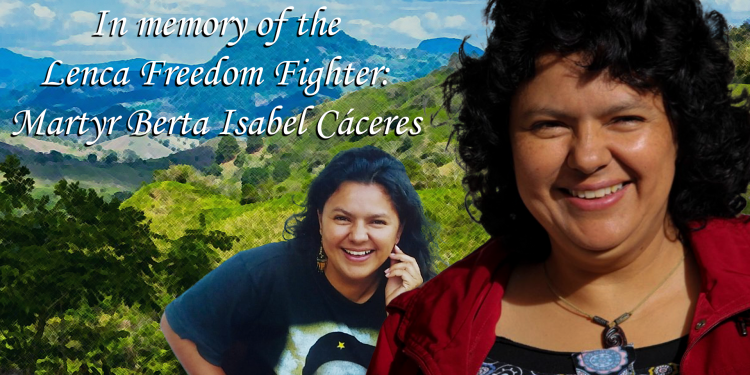NEWS CENTER – Berta Isabel Cáceres Flores, a Lenca woman, was a Honduran environmental activist, indigenous leader, and co-founder and coordinator of the Council of Popular and Indigenous Organizations of Honduras (COPINH). She won the Goldman Environmental Prize in 2015, for “a grassroots campaign that successfully pressured the world’s largest dam builder to pull out of the Agua Zarca Dam” at the Río Gualcarque. She was assassinated in her home by armed intruders, after years of threats against her life. A former soldier with the US-trained special forces units of the Honduran military asserted that Caceres’ name was on their hitlist months before her assassination.
Longing to take a stand for nature and indigenous people’s rights, Berta stepped into leadership at a very young age. As a student activist she co-founded the Council of Popular and Indigenous Organizations of Honduras to support indigenous people’s rights. Together they protested illegal logging, reclaimed many ancestral lands, and protected precious and sacred places from destruction. One of their biggest successes was their grassroots campaign to pressure the world’s largest dam builder to pull out of the Agua Zarca Dam on a sacred Lenca river.
In 1993, as a student activist, she co-founded the Council of Popular and Indigenous Organizations of Honduras (COPINH), an organization to support indigenous people’s rights in Honduras. She led campaigns on a wide variety of issues, including protesting illegal logging, plantation owners, and the presence of US military bases on Lenca land.

From 2013, Cáceres led COPINH and the local community in a year-long protest at the construction site to prevent the companies from accessing the land. Security officers regularly removed protesters from the site. On 15 July 2013, the Honduran military opened fire on the protesters, killing one member of COPINH, Tomás García, and injuring three others, including his 17-year-old son, Alan. The community reported regular threats and harassment from the company employees, security guards, and the military. In May 2014, members of COPINH were attacked in two separate incidents that resulted in two members dead and three seriously injured.
On March 27, 2015, Honduran sociologist Asís Castellanos interviewed Berta at a mall in Tegucigalpa. The two spoke a month prior to her famous Goldman Prize acceptance speech in which she proclaimed: “Wake up, humanity! There is no more time.” Their meeting came a little less than a year before Berta was murdered in her home by military hitmen in the pay of powerful local interests with connections to international financial institutions.
What are your thoughts about democracy?
“Well, first of all I don’t share the understanding of the concept of democracy that was a creation of the financial organizations that came here after the Second World War with their ideas about democracy and development, which today are also mixed up with the theme of human rights, from the perspective of Western law that constrains the very liberties and concepts that they are pushing.
And for us what is important is respect for human dignity, the right to happiness for collectivities. Democracy needs to be exercised as a horizontal power, built by the people, and defined by their participation not just in terms of their numbers but rather through their actual participation. It should be decisive, and I think it has a lot to do with which concept of power we have in mind when we speak of democracy.
Power is closely related to this, and what we are seeing now is a despotic power that imposes, that violates. So it is from that exercise of power that you build that concept of “democracy.” We understand democracy differently; for us it entails the full and just exercise of rights and freedoms that an entire nation should enjoy—not just one family.”
What are the main obstacles to democratization in this country?
“For me it’s the system that we live in. It is impossible to exercise democracy from below under capitalism, it can’t be done. We can engage in struggles to advance, to build…[but] there are huge obstacles designed to prevent it from happening. Powerful groups like the ones I mentioned, 25 powerful families from this country, the transnational mining and energy companies, the issue of privatization, of the financial organizations, of giving even more power to the military, plus everything that has been woven into the legal framework of CAFTA [US-Central America Free Trade Agreement] and also criminalization. For example, the criminalization of human rights defenders, the criminalization of those of us who defend our lands, in laws written to define us as terrorists—all this is a huge challenge.
But on our side as well, as social movements, we have challenges. I think we have to start with ourselves, working on the processes of internal democratization of social movements in order to build something coherent. And if it is possible to build spaces of internal democracy, with new practices, with political ethics that honestly reflect principles that are profoundly human, revolutionary, re-foundational, Indigenous, feminist, environmentalist, however we want to call them, the important part is that they dignify Honduran society and they dignify us as human beings.
So it’s a huge obstacle that we live in an unjust system in which people don’t think democracy or the exercise of democratic processes are possible, because there is so much lack of hope too and a crushing media war that makes people believe that if you have a good television and a good cell phone, if we can come here to the mall, if the middle class can go to Miami once in a while to have a good time, then that is democracy. So the concept, the lack of a critical consciousness about that is also an obstacle.”




